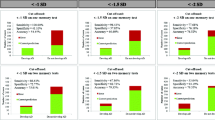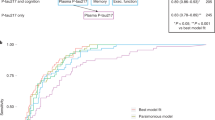Abstract
The Preclinical AD Scale (PAS) is a newly developed scale for the diagnosis of preclinical Alzheimer's disease (AD). The PAS combines six markers of preclinical AD, namely age, MMSE score, functional impairment, cognitive test performance, medial temporal lobe atrophy, and the apolipoprotein E (APOE) genotype. The aim of the study was to investigate whether the PAS can accurately identify subjects with preclinical AD who become demented during a 2 or 5 year follow-up from among subjects with mild cognitive impairment for other reasons. We also investigated whether a step-wise scoring of the PAS could reduce the number of elaborate or expensive diagnostic procedures. The PAS was scored retrospectively in two independent samples of non-demented subjects with mild cognitive impairment older than 55 years (average age 65.6 years), who were selected from a memory clinic population. In the first sample, the follow-up was 5 years (5-year follow-up sample; n=69). In the second sample, the follow-up was 2 years (2-year follow-up sample; n=23). The PAS item medial temporal lobe atrophy was not scored in the 5-year follow-up sample. A PAS cut-off score of 4/5 could best identify subjects with AD-type dementia at follow-up (n=25) in the 5-year follow-up sample with a sensitivity of 80 % and a positive predictive value of 77 %. A PAS cut-off score of 5/6 could best identify subjects with AD-type dementia at follow-up (n=8) in the 2-year follow-up sample with a sensitivity of 88 % and a positive predictive value of 70 %. The positive predictive value could be increased to 94 % in the 5-year follow-up sample and to 80 % in the 2-year follow-up sample by using higher cut-off scores, but this reduced the sensitivity. Step-wise scoring of the PAS had the same diagnostic accuracy as the total PAS score and reduced the number of cognitive assessments by 22 to 38 %, the number of assessments of medial temporal lobe atrophy by 57 to 74 %, and the number of APOE genotypings by 74 %. It is concluded that the PAS is a useful scale to identify subjects with preclinical AD who will become demented during the next 2 or 5 years. Step-wise scoring of the PAS can reduce the number of elaborate or expensive diagnostic procedures considerably.
Similar content being viewed by others
Author information
Authors and Affiliations
Additional information
Received: 21 February 2001, Received in revised form: 20 July 2001, Accepted: 25 July 2001
Rights and permissions
About this article
Cite this article
Visser, P., Verhey, F., Scheltens, P. et al. Diagnostic accuracy of the Preclinical AD Scale (PAS) in cognitively mildly impaired subjects. J Neurol 249, 312–319 (2002). https://doi.org/10.1007/s004150200011
Published:
Issue Date:
DOI: https://doi.org/10.1007/s004150200011




